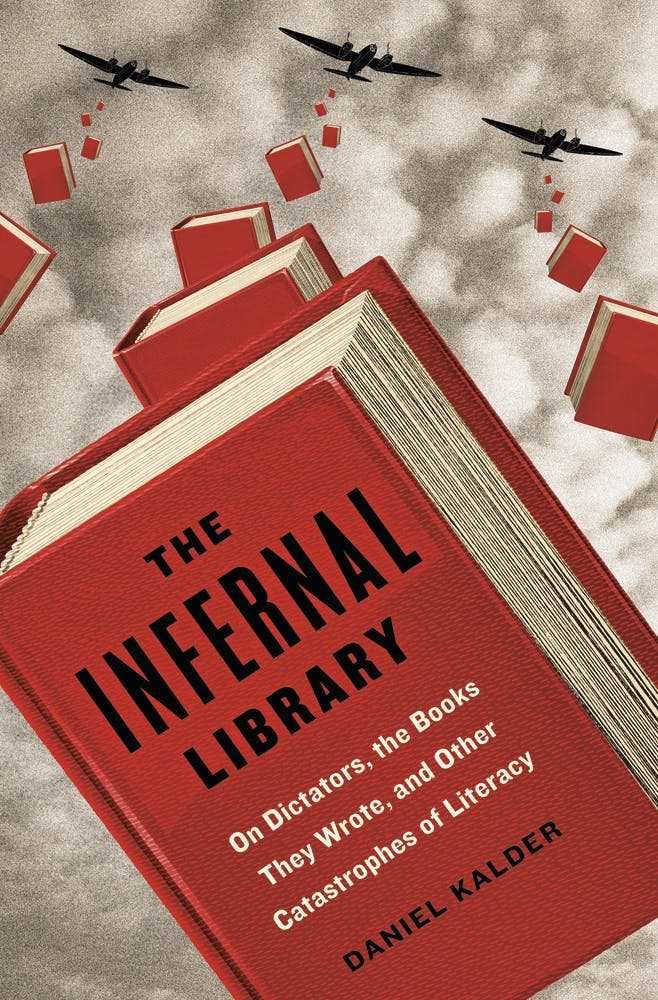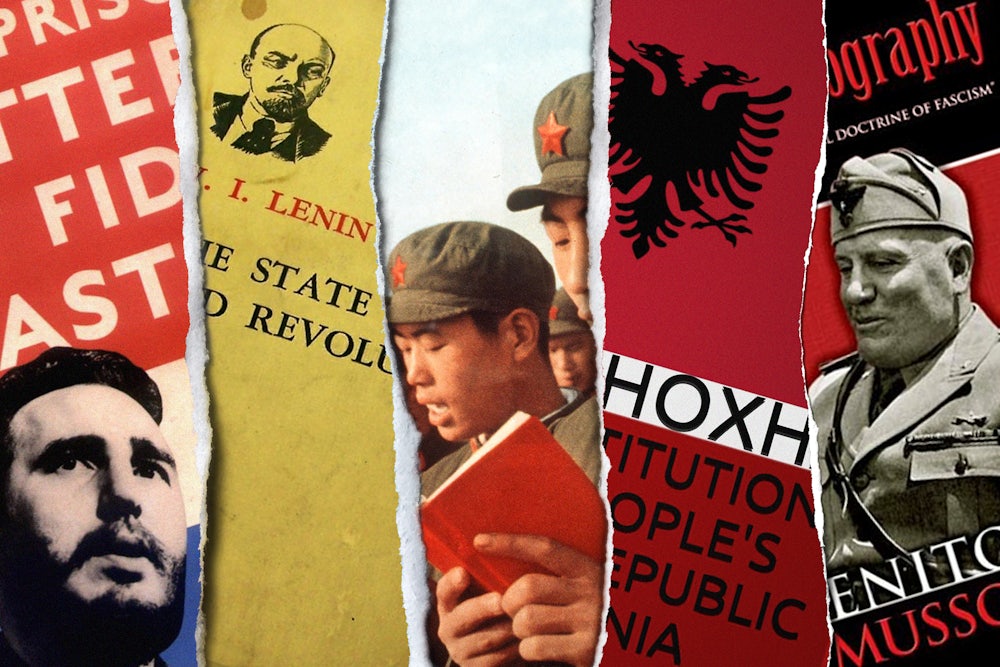The Book of Genesis begins by asserting, in the most fundamental way, that when God says a thing, it happens: “And God said, ‘Let there be light,’ and there was light.” We mortals may or may not be true to our word, but what makes the divine the divine is this complete lack of daylight between word and deed.

Authoritarian leaders have long aspired to this godlike union of word and action. A dictator does not deal in facts and reason, but rather in the brute force that makes his word law, that turns each and every utterance into concrete action, unencumbered by anything but his own will. It’s there in the very term itself: dictator, one who dictates, one who merely has to speak in order to bring about change, so strong is the bond between proclamation and action.
That dream echoes through a line like this: “The Word is the most sacred gift God gave to human beings”—a line that comes not from the Bible or the Quran, but from a book that appeared in every mosque, library, and government building in Turkmenistan: The Rukhnama. Written by Turkmenbashi, the dictator who ruled the country from 1985 until his death in 2006, The Rukhnama is among the most bizarre of literary productions: It grew initially out of a need to gather up old folk traditions of Turkmenistan in a hope to reestablish its identity in the waning days of the Soviet Union, but grew into a remarkable testament of the ego and delusion of its author.
Constructing an elaborate cult of personality, Turkmenbashi banned gold teeth, lip syncing, ballet, opera, the circus, and smoking. He renamed January after himself and renamed bread after his mother. And he renamed September after his great book, stating that any one who read it start to finish three times would be guaranteed entrance to Heaven.
Encountering The Rukhnama inspired the journalist Daniel Kalder to explore other works of authoritarian literature, resulting in The Infernal Library: On Dictators, the Books They Wrote, and Other Catastrophes of Literacy. Surveying the literary output of leaders from Lenin to Kim Jong-il, Kalder asks why so many totalitarians dabble in literature. Alongside Turkmenbashi’s sui generis “masterpiece” Kalder considers the dense treatises of Lenin, the aphorisms of Chairman Mao, and the romances of Saddam Hussein, which he was still writing and rushing to print even as U.S. forces were invading his country in 2003.
The curious paradox explored here is that so many of these books are simultaneously unreadably bad and yet are blockbuster bestsellers—not because of their popularity or quality, of course, but because they’re written by dictators, and forced on their populace by oppressive regimes. Often such works are grossly overwritten (Enver Hoxha’s memoirs ran to thirty volumes) and/or plainly incomprehensible—but when you rule with an iron fist, who dares to edit you? What runs through them all is a yearning for a perfect union between word and deed, between the written page and the world itself. As a character in Don DeLillo’s Mao II remarks, “The cult of Mao was the cult of the book.” How can you be a dictator without your sacred text, without a document to show your word is law?
Although many of these books are unreadable, dictator lit happens to run the gamut of quality. For every aesthetic disaster, there’s an unexpected stylist. Take Mussolini. While Kalder notes that the ideas and arguments are far from original, “Mussolini’s pleasure in language is nevertheless infectious. There is an exuberance to the play of insults, a delight in mockery, a joy in blasphemy.” And while he initially derides Mao’s “rather excruciating canon,” he’s nonetheless forced to admit a page later that the Chairman was “a master of slogans,” adept at selecting the Chinese characters that resonated with the most meaning, and that through his stern propagandizing another voice would often appear, one “lyrical and filled with power and hope and the fire of belief.”
Many dictators started their lives with aspirations to write, a primal urge that predated politics or despotism. There are, it turns out, two kinds of dictatorial writers: those who used their writing as part of their ascendancy, and those who began publishing only once they were already in power, when their audience was already captive. Thus Mao, Mussolini, Lenin, and Hitler all to varying degrees have something going for their writing, however savage, as evidenced by the fact that it helped propel their message and popularity—whereas Saddam Hussein, Kim Jong-il, and others who came to writing later, are mere dabblers in the world of letters.
It’s an odd position Kalder finds himself in; even as he’s denouncing these men—brutes, all of them—he still has to separate the wheat from the chaff, and to make grudging distinctions between his subjects. But it’s important work in these perilous times. With fascism and authoritarianism once again on the rise, it’s more vital to do more than simply denounce something like Mein Kampf, and work instead to understand why so many readers found it appealing:
Unencumbered by the theoretical and stylistic obligations of nineteenth-century economic “science,” and secure in its anti-intellectualism, Mein Kampf rejects both class war and searching for the “soul of the soul” in favor of a berserk hatred that is far more visceral, enduring, and alluring to the great darkness of the human heart. Homeric in its crudity, in its liberating simplicity, it transcends epochs and borders, attaining a perverse immortality by its sheer, unrelenting evil.
In one of the more central reminders The Infernal Library has to offer for these times, Kalder concludes: “Let us not delude ourselves into thinking that it is only the masterful expression of great truths that grants a book access to the pantheon of the immortals; the violent and shameless expression of hatred also endures.”
Many politicians, of course, write books, in order to gain a form of legitimacy and authority. The ghost-written autobiography of the American politician is a time-honored tradition, an attempt to angle for policies, prepare for an upcoming election, secure one’s legacy, or cash in at the end of a career. But for the most part these partake of a well-established genre. Rarely are they judged by literary standards (Barack Obama’s Dreams of My Father being perhaps an exception); instead they are mainly judged as means to their respective ends.
Dictator lit, on the other hand, is an altogether more curious genre, unbound by these concerns and behold only to the strongman’s narcissism. Just as the dictator wants his words to become action, he wants his essence to be preserved in his words: The book is his means of achieving immortality. If writing something—anything, be it ponderous political tome or awful poetry—became a de rigueur gesture of dictators, it was because “they sought to appropriate the cultural authority of ‘the book’ to give their regimes a patina of respectability.”
To abuse an analogy from Virginia Woolf, a small authoritarian country is like a room of one’s own: it allows one the freedom and the space to create. Thus the earnest, workmanlike On the Art of the Cinema, by Kim Jong-il, a mixture of film criticism and technical discussions of filmmaking (“It’s not exactly Cahiers du cinema, but Kim Jong-il’s how-to book actually, well, makes sense.”) and Saddam Hussein’s Zabiba and the King: “By no means is it good, but it is at least the work of a man rather than a monument, and, in comparison to most other works in the dictatorial canon, very honest.” If you’ve ever wondered what kind of books pure, unrestrained ego produces, these monsters offer a rather fascinating case study.
Those who live by the despotic ego, fall by the despotic ego. Almost all of these books (with the depressing exception of Mein Kampf) quickly vanish once the Dear Leader is Dearly Departed. Like a vampire in sunlight, the literary reach of the dictator’s book crumbles to dust almost the second after his death, in what Kalder calls a “great unremembering,” which “engulfs and erases almost all trace of the sacred text once the leader dies.”
Such was the case of Turkmenbashi and his Bukhnama. Kalder waits until the very end, past sometimes perfunctory synopses of other writers and regimes, to get to Turkmenistan, where his prose becomes suddenly luminous, elegiac, and even moving. Turkmenbashi, Kalder writes, “was striving to create not merely an ideology but a new history, a new mythology for his nation…. It would have been a monumental task for a very great author, but Turkmenbashi was not even a mediocre author. He was a very, very bad one. With The Rukhnama, he aimed for the stars but ended up in the landfill.”
And yet, it was in Turkmenistan—among the televised concerts of young people on stage reading The Rukhnama in a variety of languages and among the government minders who intoned that the book was “profound” but could not say why—that Kalder says he “felt the effect of the forced consensus that gives the book life for as long as the force is in place to maintain it.” Catching the regime at the perfect moment when its demise was evident but not yet realized, Kalder’s observations of Turkmenistan are among the most poignant and acute moments in the book.
It’s worth noting that The Infernal Library, despite being about the ways in which writers distort and manufacture history, itself has no footnotes or endnotes, not even those unobtrusively keyed to end phrases in the back. There’s a “selected” (thus, one presumes, not complete) bibliography, which makes it a little unclear how much here is Kalder’s own work and where he’s borrowing from scholars more trained in the histories of the countries he’s discussing. When, near the end, Kalder offers a block quote sourced only to “a well-educated commentator who should have known better,” whom he declines to name, one is reminded of how much is kept out of view in The Infernal Library—which is exactly the opposite way one should feel after finishing a book about writing and power. (It’s quite possible this was an editor or publisher’s decision, rather than Kalder’s, but it’s still not a good precedent.)
After all, the speaker can matter just as much as what’s being said. This is the lesson of The Infernal Library: Words change their meaning when they’re published in a landscape of authoritarian control, when the pen is wielded by an iron fist.
